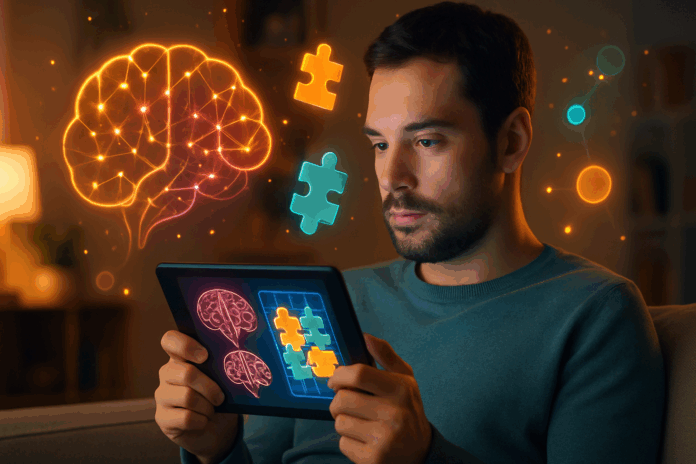Introduction: The Growing Appeal of Brain Games for Adults in Mental Wellness
In recent years, the concept of cognitive health has evolved significantly, moving beyond traditional educational tools and therapy-based interventions. Adults are increasingly embracing the best brain games for adults as not only a form of entertainment but also a scientifically supported way to enhance mental wellness, sharpen focus, and strengthen memory. These activities have gained popularity due to their accessibility through the best brain game apps and online platforms, as well as the growing body of research highlighting their benefits. As cognitive longevity becomes a vital aspect of modern living, the best brain games for adults stand out as an engaging and proactive approach to maintaining mental sharpness well into later years.
You may also like: Boost Brain Power Naturally: Evidence-Based Cognitive Training Activities and Memory Exercises That Support Long-Term Mental Health
It’s not just tech-savvy young adults who are exploring brain-training games and memory-enhancing apps; middle-aged professionals and retirees alike are embracing the challenge of daily brain games to maintain mental acuity. The accessibility of free brain games for adults without downloading has further fueled interest, offering immediate cognitive engagement with zero barriers to entry. While puzzles and logic challenges have always had their place in adult leisure activities, today’s brain game application options combine neuroscience, gamification, and convenience in powerful new ways. As the market for the best brain fitness apps continues to grow, so does the public’s interest in their potential benefits—not only for individual performance but for lifelong mental health and well-being.
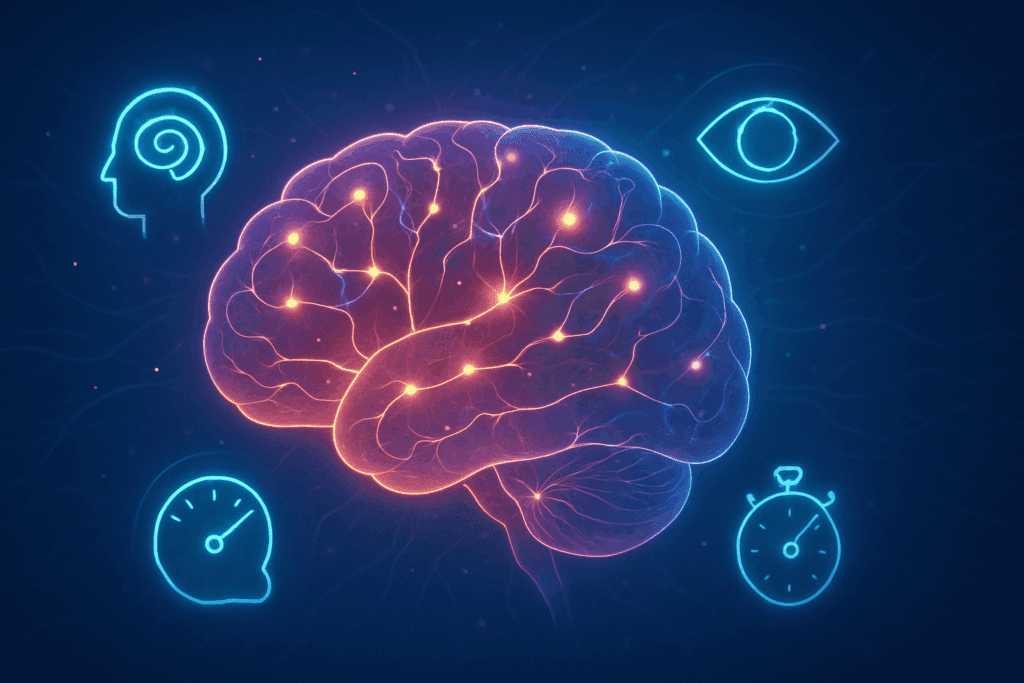
Understanding How Brain Games Support Cognitive Function
At the core of brain training games lies the principle of neuroplasticity—the brain’s remarkable ability to rewire itself in response to new challenges, learning experiences, and environmental demands. Cognitive games are designed to take advantage of this principle, targeting specific areas of brain function such as memory, attention, problem-solving, and speed of processing. When regularly stimulated through targeted exercises, the brain strengthens its existing neural pathways and can even develop new ones. This is the scientific foundation behind the increasing credibility of top brain training apps and free intellectual games as tools for mental enhancement.
While some may question whether games for brain training truly have an impact, studies suggest that certain types of structured brain exercise games online can lead to measurable improvements in working memory, task switching, and sustained attention. These skills are crucial for daily functioning, from multitasking at work to remembering important appointments. The best brain training apps go a step further by incorporating adaptive algorithms that adjust difficulty levels based on user performance, ensuring the cognitive load remains both appropriate and stimulating. This level of customization enhances the brain’s learning response and makes the experience more enjoyable, thereby encouraging consistency—an essential factor in cognitive improvement.
Cognitive decline does not happen overnight. It is a gradual process influenced by aging, stress, lifestyle, and sometimes underlying health conditions. By engaging in good brain games regularly, adults can build a cognitive reserve that may delay or reduce the impact of age-related mental decline. Whether it’s through mind improvement games focused on pattern recognition or best mind game apps that emphasize logical reasoning, these tools offer an opportunity to not only prevent deterioration but also enhance one’s existing strengths. The psychological benefits of mastery, accomplishment, and daily mental stimulation should not be underestimated in contributing to mental wellness.
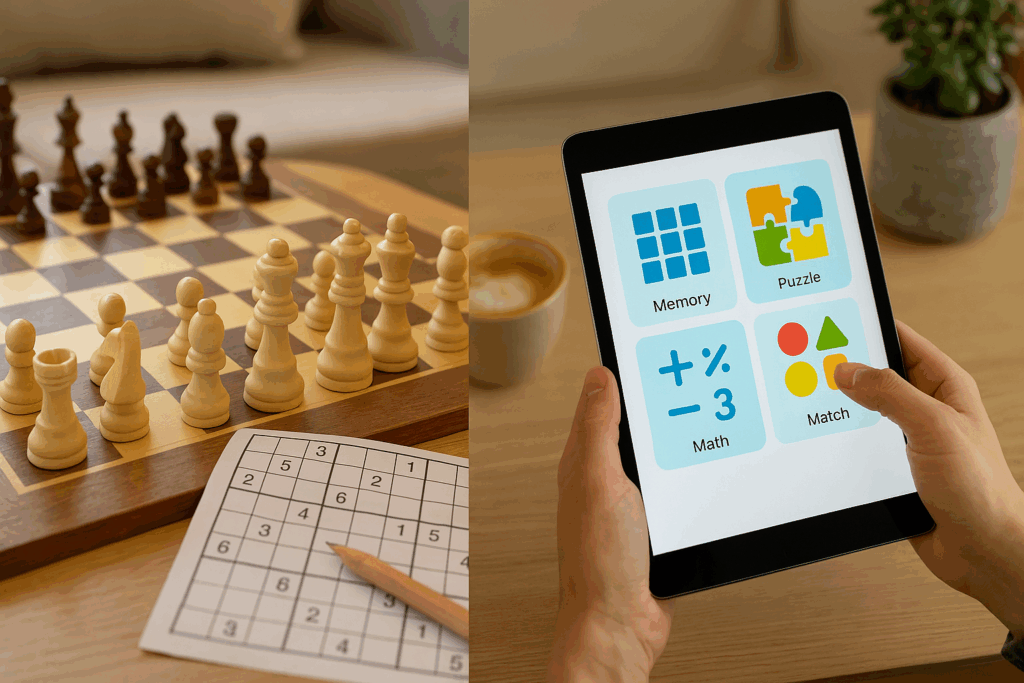
Exploring the Spectrum of Brain Games for Adults: From Classic Puzzles to High-Tech Apps
The phrase “brain games for adults” encompasses a remarkably diverse set of activities. On one end of the spectrum are classic games like Sudoku, chess, and crossword puzzles—long known for their mental challenge. On the other end are technologically advanced platforms like Lumosity, Peak, and Elevate, which are specifically engineered to train different facets of cognitive ability. For users seeking a blend of both, the market now offers hybrid formats such as brain games applications that combine traditional logic games with sleek, gamified interfaces.
One of the appealing features of today’s best brain game apps is their focus on multitasking and executive function. These apps are often organized into training modules that target specific brain areas, such as spatial memory, attention control, or verbal fluency. The top-rated brain game apps frequently employ visually engaging tasks that require the user to make quick decisions, recall information under time constraints, and adapt to increasing difficulty. These challenges mirror real-life cognitive demands, which is why these tools are increasingly being recommended not only by enthusiasts but also by cognitive therapists and neuropsychologists.
Even those skeptical of commercial products can access a growing suite of free brain games for adults that are evidence-based and user-friendly. The availability of the best free brain game apps and brain exercise games online has democratized cognitive training, allowing anyone with a smartphone or computer to access high-quality content. These tools serve not only as mental workouts but also as daily rituals that provide structure and stimulation, which are particularly important for those working from home or entering retirement. By using these games for brain training, adults can integrate cognitive fitness into their everyday routine with minimal effort.
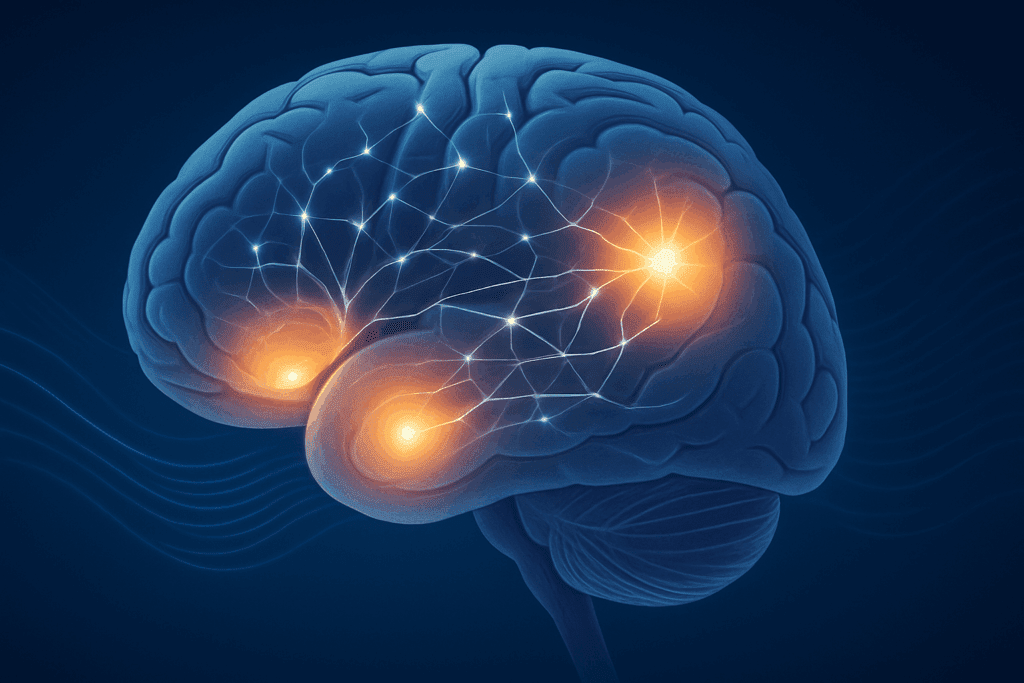
The Neuroscience Behind Brain Training and Why It Works
Understanding why brain training games are effective requires a closer look at the brain’s architecture and its dynamic learning processes. The adult brain, once thought to be static, is now known to retain remarkable flexibility. Through a process called synaptic pruning, the brain constantly eliminates less-used neural connections while reinforcing those that are frequently activated. Brain workout apps that incorporate repetition, variation, and challenge leverage this natural process to reinforce mental sharpness over time.
For example, memory-enhancing apps often include tasks that require delayed recall, recognition, and information synthesis. These exercises stimulate the hippocampus and prefrontal cortex—two areas closely associated with memory and executive function. Likewise, the best memory apps simulate real-life cognitive challenges by asking users to memorize sequences, track shifting patterns, or distinguish subtle differences between stimuli. This targeted engagement is particularly useful for older adults, whose cognitive performance can benefit significantly from this kind of structured stimulation.
There is also evidence that top-rated brain training apps improve emotional regulation and resilience by enhancing the brain’s attentional networks. When adults engage in games that require sustained focus and inhibition of distractions, they are essentially training their ability to self-regulate. This has significant implications for mental health, as better attention control is associated with reduced anxiety, improved mood, and a greater sense of self-efficacy. In this context, daily brain games do more than enhance intellectual abilities—they contribute to emotional stability and overall well-being.
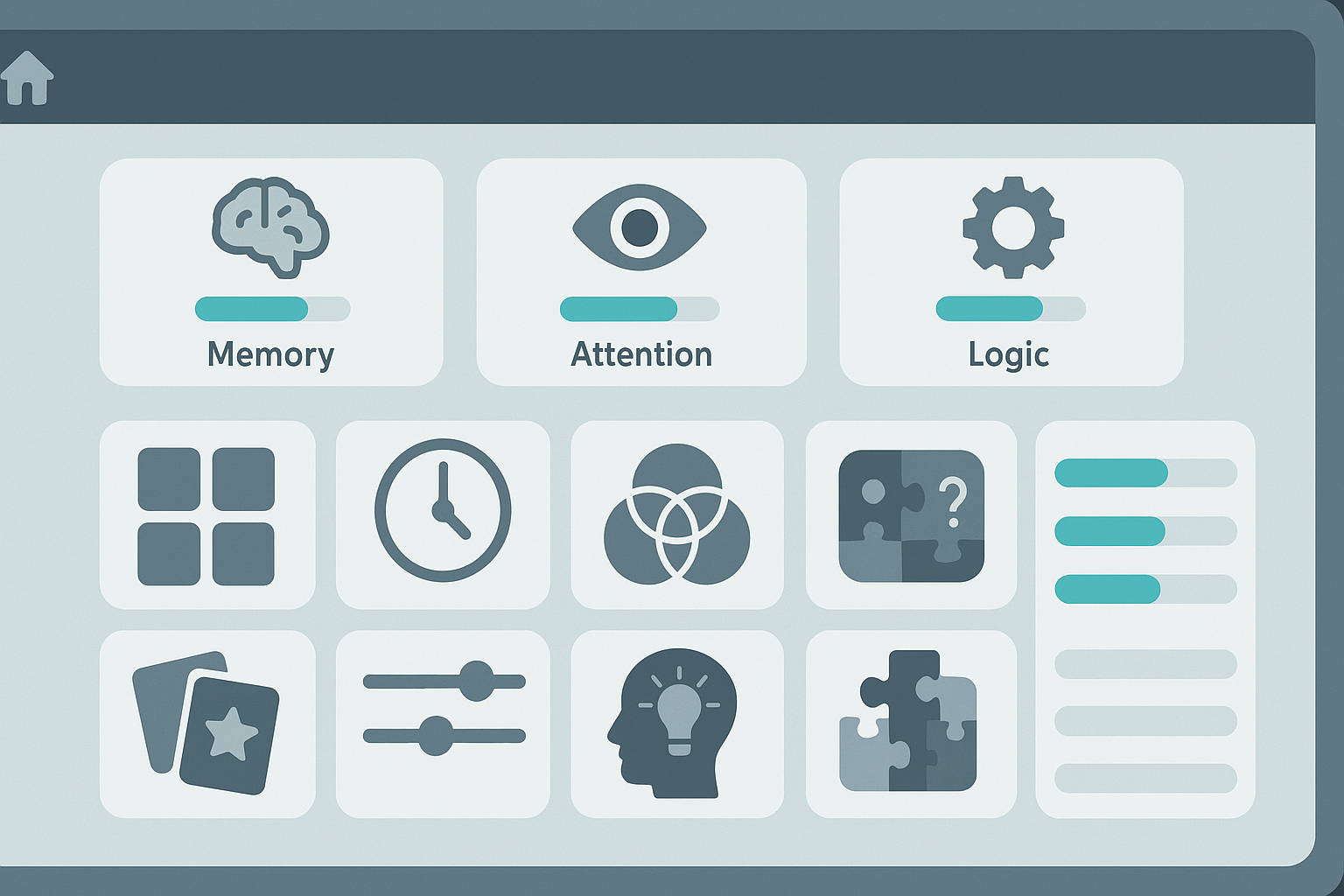
Personalizing Your Cognitive Training: Matching Games to Your Mental Goals
Not all cognitive games are created equal, and selecting the best brain games requires an understanding of one’s personal cognitive goals. For individuals seeking to sharpen their memory, memory-enhancing apps and the best app for memory improvement are excellent choices, especially for those with progressive difficulty and diverse memory modalities. For those aiming to boost focus and attention span, brain training games that emphasize selective attention and response inhibition will provide the most benefit.
Many adults gravitate toward the best brain workout apps not just for skill development but for the motivational boost that comes with seeing one’s progress tracked over time. These apps often include performance dashboards, streak counters, and progress badges—features that tap into behavioral psychology principles like reward sensitivity and self-monitoring. This personalization makes it easier to stay committed, which is essential since the benefits of cognitive training are most evident with regular and sustained use.
Some brain games application platforms offer assessments or onboarding quizzes to help users identify the most appropriate challenges based on cognitive strengths and weaknesses. Others provide curated programs tailored to specific needs—whether it’s recovering from mental fatigue, improving decision-making speed, or enhancing verbal memory. Whether using top brain training apps or free intellectual games, the key is to ensure alignment between the game’s cognitive demands and the user’s training objectives. When this alignment is achieved, users are more likely to enjoy the experience and benefit cognitively.
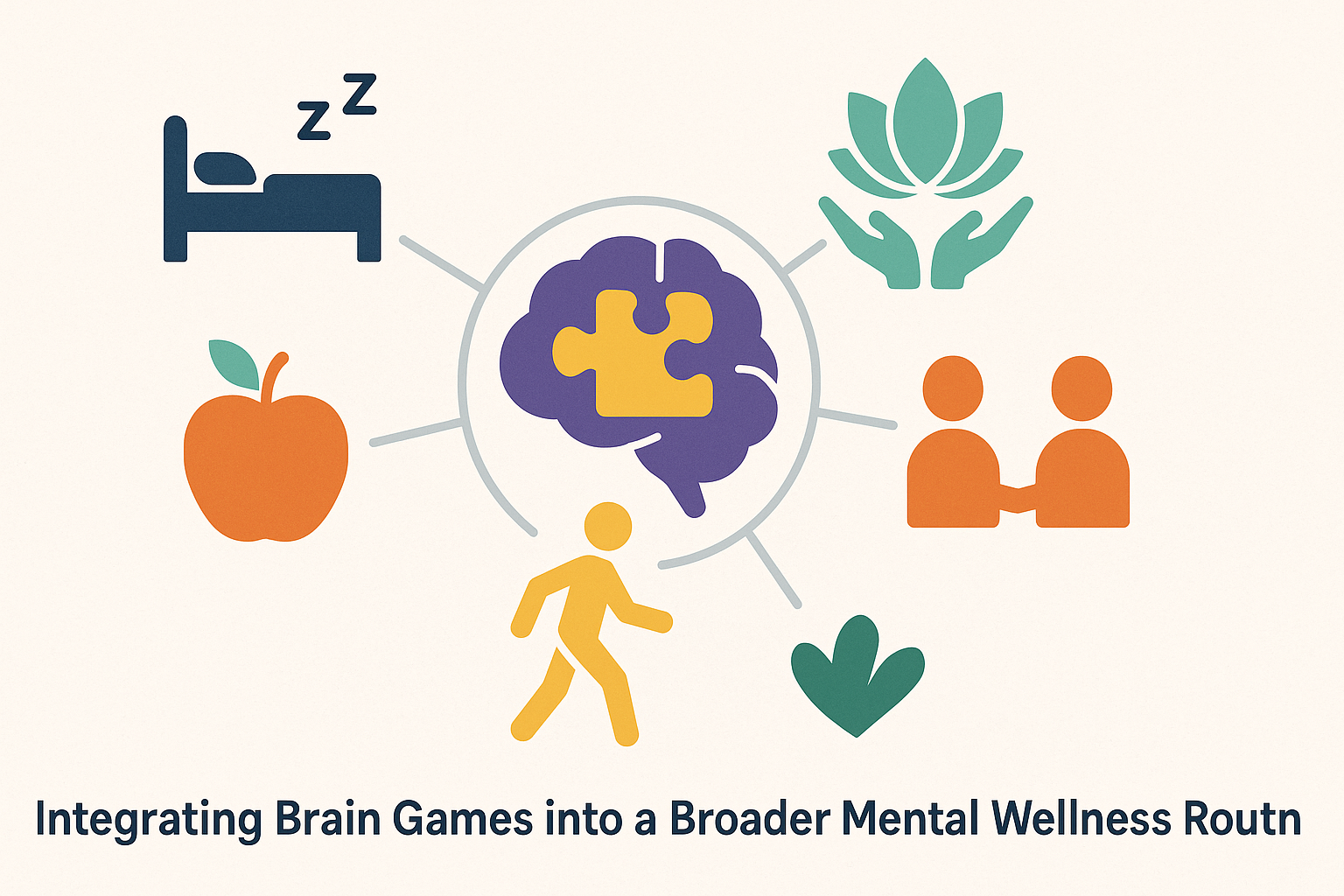
Integrating Brain Games into a Broader Mental Wellness Routine
While brain games for adults online offer compelling tools for cognitive enhancement, they are most effective when integrated into a broader lifestyle that supports mental wellness. Nutrition, physical activity, quality sleep, and social interaction all play critical roles in brain health. Brain games should be viewed as one component of a comprehensive brain care plan, enhancing other strategies rather than replacing them. For instance, pairing cognitive games with meditation and mindfulness training can further improve focus and reduce mental fatigue.
The role of routine cannot be overstated when it comes to cognitive training. Setting aside time each day for good brain games—perhaps during a morning coffee break or as a post-lunch activity—establishes consistency, which is vital for long-term impact. Just as a physical workout regimen benefits from regularity, so does cognitive exercise. Many users of the best brain fitness apps report improved mood, sharper thinking, and greater productivity after just a few weeks of consistent engagement.
For those who are less inclined to use technology, options abound in the form of analog activities that simulate similar benefits. Crossword puzzles, logic riddles, memory card games, and even storytelling circles serve as forms of mental gymnastics. However, the edge that digital platforms offer—especially the best brain game apps—is the ability to customize, track, and scale challenges. This makes them uniquely suited for long-term engagement and measurable progress. The beauty of cognitive games is their flexibility; they can be adapted to almost any lifestyle, learning preference, or cognitive need.
1. What are some advanced ways adults can personalize their brain-training experience?
Personalizing brain training goes beyond just selecting a few fun games. Adults can optimize their experience by identifying specific cognitive goals—like improving short-term memory, strengthening executive function, or enhancing reaction time—and then selecting the best brain training apps or brain games applications that target those specific areas. Some of the top-rated brain game apps now include built-in assessments that evaluate cognitive strengths and weaknesses before offering a tailored program. Additionally, adults who want to track progress in detail should opt for platforms that provide longitudinal data, allowing users to see how daily brain games influence their abilities over time. By integrating tools like best memory apps or cognitive games with real-world challenges—such as recalling grocery lists without prompts or mentally organizing daily tasks—users create a multidimensional training environment. While using mind improvement games or games for brain stimulation, pairing app-based activities with lifestyle changes like improved sleep or meditation further supports brain health. Ultimately, choosing the best brain game apps involves understanding that progress is not always linear and that the most effective experiences often combine structured digital activities with real-world mental tasks.
2. Can brain-training games actually influence emotional regulation and mental resilience?
Yes, brain training games can support emotional regulation and resilience, especially when designed to challenge attentional control and impulse regulation. The best brain games often include tasks that demand emotional neutrality, which helps users learn to focus even when distracted or stressed. Top brain training apps frequently feature games that train the prefrontal cortex, the brain area associated with decision-making and emotional control. This means that over time, consistent use of brain exercise games online may help adults become less reactive to stress and more adaptive in high-pressure situations. Incorporating daily brain games that stimulate emotional processing pathways can create noticeable improvements in how one handles interpersonal conflicts, work stressors, and mood fluctuations. While emotional regulation isn’t always the primary advertised benefit of the best brain workout apps, research increasingly shows that structured cognitive games have the potential to impact mental health in a broader sense. Free brain games for adults without downloading can be a particularly accessible way for individuals to explore these benefits without cost barriers.
3. How do brain games compare to traditional learning methods for improving cognitive skills?
While both brain games and traditional learning support cognitive development, they engage the brain in different ways. Traditional learning—such as reading, language acquisition, or formal education—relies heavily on long-term memory, comprehension, and conceptual reasoning. In contrast, the best brain fitness apps focus more on real-time problem-solving, mental agility, and short-term memory. For instance, brain games for adults online may improve attention span and pattern recognition faster than textbook study because they leverage interactive feedback loops and timed challenges. Unlike passive learning, cognitive games require immediate decision-making, stimulating neural circuits that are less engaged during traditional education. Furthermore, top-rated brain game apps often use adaptive algorithms that adjust task difficulty to maintain optimal challenge levels, something traditional education doesn’t typically offer. Many people find that using a brain workout app in tandem with continued education creates a synergy that maximizes brain health. Whether you’re using the best mind game apps for daily tune-ups or free intellectual games for occasional play, these tools complement formal learning by targeting underutilized areas of cognitive function.
4. Are there specific brain games that can help with multitasking and decision-making?
Absolutely, and these types of games are increasingly popular among busy professionals and older adults. Many top-rated brain training apps are specifically designed to simulate multitasking scenarios, requiring users to monitor several pieces of information simultaneously. These brain brain games often incorporate visual and auditory stimuli that require quick decision-making while maintaining accuracy. For example, some of the best brain game apps feature task-switching games that mirror real-world challenges like answering emails while on a conference call. Brain games for adults that train cognitive flexibility help strengthen the neural pathways associated with prioritization, working memory, and inhibition control. Users can find targeted support for decision-making within apps that offer modules dedicated to executive function. By practicing these scenarios in a controlled, low-stakes environment, adults can build confidence in their decision-making speed and accuracy in real-life situations. Even free brain games for adults, when designed properly, can offer robust cognitive workouts for these essential skills.
5. How can older adults use brain games to reduce the risk of cognitive decline?
Brain training is especially relevant for older adults, as cognitive functions such as processing speed and memory can begin to decline naturally with age. Incorporating the best brain-training apps into a daily wellness routine can provide much-needed mental stimulation, which may slow the progression of cognitive impairment. Some of the best brain games focus on long-term memory and language fluency—skills that are crucial for maintaining independence and quality of life. Older users may also benefit from memory-enhancing apps that use spaced repetition and recall-based exercises, which are known to bolster hippocampal function. What sets top brain training apps apart for older users is their ability to adjust difficulty automatically, offering a manageable but effective challenge. Moreover, engaging with free brain games eliminates accessibility barriers for seniors who may not be comfortable with subscriptions. Whether using a brain workout app or participating in brain games for adults online, the key to cognitive preservation lies in consistency, diversity of tasks, and personal motivation.
6. What role does gamification play in the effectiveness of brain games for adults?
Gamification is a powerful motivator and plays a pivotal role in the success of modern brain games. By incorporating elements such as rewards, progress tracking, and competitive scoring, the best mind game apps increase user engagement and sustain long-term usage. Many of the best brain game apps utilize gamified systems to provide immediate feedback, a feature proven to enhance learning retention. Adults who might otherwise find cognitive tasks tedious are more likely to return to apps that celebrate their progress with badges, levels, or leaderboards. This approach not only encourages regular participation but also helps users maintain the mental discipline needed for cognitive change. In essence, gamification turns abstract exercises into tangible achievements, which reinforces the neuroplastic benefits of consistent training. Even free brain games for adults without downloading are starting to adopt gamified interfaces to attract and retain users. As gamification evolves, it may eventually include social competition or integration with wearable devices, pushing the boundaries of cognitive games even further.
7. Can brain-training apps be integrated into workplace wellness programs?
Yes, and forward-thinking companies are increasingly including brain training as part of their corporate wellness initiatives. Cognitive fatigue and diminished focus are common workplace challenges, particularly in high-stress environments. Offering access to the best brain fitness apps or free intellectual games can serve as a productive mental break while boosting long-term productivity. Some top-rated brain training apps are even designed for use in team settings, where collaborative challenges can foster communication and strategic thinking. By including cognitive games in workplace wellness programs, employers can promote employee mental health, prevent burnout, and enhance creativity. Using daily brain games at scheduled intervals—such as before meetings or during lunch breaks—can re-energize employees and increase engagement. Additionally, providing access to a brain games application sends a strong message that cognitive health is a valued part of holistic wellness. Companies investing in brain games demonstrate a progressive attitude toward mental resilience and cognitive sustainability in the workforce.
8. What should users consider when evaluating the best free brain game apps?
Not all free apps are created equal, so discerning users should look for brain-training games backed by credible research and user data. While the term free brain games” may sound appealing, users should prioritize quality over quantity when selecting apps. A good brain games application should offer a variety of exercises targeting different cognitive domains, such as memory, attention, and logic. Additionally, top-rated brain game apps typically offer adaptive difficulty and performance tracking to ensure that users are continually challenged. It’s also beneficial to seek out the best memory apps that integrate well into daily routines without becoming intrusive. Apps that allow offline access, personalized reminders, and integration with wellness trackers can add extra value. Reviewing peer feedback and checking whether the app has undergone any independent studies or clinical validation are also important steps. Ultimately, even free brain games for adults should deliver a structured, engaging, and scientifically sound training experience that supports real-world mental agility.
9. How does Lumosity compare to newer brain game platforms?
When people ask, “What is Lumosity?” they’re often referring to one of the pioneers of the brain training app movement. Lumosity brought mainstream attention to brain games for adults online with its clean design and broad range of games. However, while Lumosity remains a reputable option, newer platforms are emerging with more targeted tools, better customization, and enhanced user analytics. Some of the best brain workout apps now incorporate AI to adapt exercises based on real-time performance. Others offer cross-platform accessibility, allowing users to continue training seamlessly across devices. Compared to many newer apps, Lumosity may appear more generalized, though it still holds its own as a reliable, user-friendly starting point. For users with specific goals—like seeking the best app for memory improvement or real-time stress reduction—modern alternatives might offer a more tailored experience. Nevertheless, Lumosity’s continued updates and research foundation make it a solid choice within the growing field of top brain training apps.
10. Can children or teens also benefit from brain games designed for adults?
Surprisingly, yes—many of the best brain games for adults also offer benefits for younger users, especially teens seeking to improve academic performance or executive function. However, the chosen brain games application must be age-appropriate and cognitively suitable. Some of the best brain training apps feature settings or modes that adjust complexity based on age and cognitive level. While the best free brain game apps often target adults, their foundational logic and memory exercises can help teens develop critical thinking and sustained attention. Parents or educators looking to support cognitive development should prioritize top-rated brain game apps that offer educational modules or adaptive algorithms. Introducing games for brain stimulation early on may also reduce the risk of attention disorders or learning challenges later in life. By using the best brain fitness apps in a guided, intentional way, younger users can develop healthy digital habits while expanding their mental capacity. Just as adults benefit from daily brain games, so too can teens when given the right tools and encouragement.
Conclusion: Embracing Brain Games as a Lifelong Investment in Cognitive Health
The promise of brain games for adults lies not in a magic cure for cognitive decline but in their ability to foster resilience, enhance mental agility, and support overall well-being throughout life. As research continues to explore the connection between cognitive training and brain health, one thing remains clear: daily engagement with cognitive games, whether through best brain training apps or free brain games free from commercial distractions, represents a proactive and empowering approach to mental fitness.
In an age where neurodegenerative conditions like Alzheimer’s and dementia pose significant public health challenges, the best brain games offer more than just entertainment—they provide a vital buffer against the erosion of mental clarity. These tools serve as mental mirrors, reflecting our cognitive strengths and alerting us to areas in need of reinforcement. From the best mind game apps that challenge logic and strategy to brain exercise games online that support attention and memory, the range of options ensures that every adult can find a meaningful way to stay mentally active.
Ultimately, the goal is not perfection but progress. Whether you’re exploring what Lumosity is for the first time, downloading a brain workout app, or simply enjoying a set of free brain games for adults without downloading, the journey toward cognitive vitality begins with one step: showing up each day to challenge your mind. As with physical fitness, the benefits of mental exercise compound over time. By choosing to engage with games for brain health regularly, you are investing not just in your present focus and memory but in your lifelong mental wellness and overall quality of life.
Further Reading:
11 Memory Games That Make Brain Training Fun And Easy

